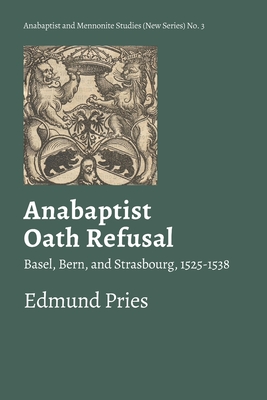Anabaptist Oath Refusal: Basel, Bern, and Strasbourg, 1525-1538

Anabaptist Oath Refusal: Basel, Bern, and Strasbourg, 1525-1538
-C. Arnold Snyder, Professor of History, emeritus.
Conrad Grebel University College, University of Waterloo. "Edmund Pries's Anabaptist Oath Refusal provides a focused treatment of this disruptive practice, which was distinctive of an
emerging tradition of dissent. Offering a thorough survey of early modern printed materials and edited compilations of legal records, the book evaluates both commonalities and contrasts in urban authorities' approaches to nonconformity, while tracing developments in Anabaptist behaviour and argumentation. Its detailed work places Anabaptist action alongside a kaleidoscopic overview of the oath's history in European political and social life and its place in early Reformation debates about hermeneutics and the proper relationship of the church to the magistracy."
-David Y. Neufeld, Assistant Professor in History.
Director, Institute for Anabaptist and Mennonite Studies.
Conrad Grebel University College, University of Waterloo. "Today, in our Western world, the oath is often a side-issue. But for the 16th century Anabaptists, it was one of the 'crucial points' (Knackpunkte) why persecution began with full force. For the Anabaptists, swearing the oath touched on their discipleship, confirming that their loyalty was to the kingdom of God and his church. Yet for the territorial rulers and city authorities, loyalty and faithfulness also manifested itself in taking the oath. Oath refusal was a highly political and 'highly inflammatory' (brandgefährlich) matter, as Edmund Pries' study impressively illustrates."
-PD Dr. Astrid von Schlachta, Mennonitische Forschungsstelle / Universität Hamburg "Christian communities have long wrestled with the perennial question of how to live in the world and yet not be a part of it in ways that depart from discipleship to Jesus Christ. Sixteenth century European societies were bound together by architectures of oath-taking. But in Matthew's Gospel, Jesus tells his disciples, "I tell you not to swear [oaths] at all... Rather, let your utterance be 'Yes, yes' [and] 'No, no'" (Mt. 5.33-37; cf. James 5.12). Edmund Pries's Anabaptist Oath Refusal tells us how important these oaths were, and describes the various ways in which the Anabaptists interrogated them. One of the reasons why the Anabaptist groups were persecuted turns on this question of oath-taking. At the same time, Cat
PRP: 195.98 Lei
Acesta este Prețul Recomandat de Producător. Prețul de vânzare al produsului este afișat mai jos.
176.38Lei
176.38Lei
195.98 LeiLivrare in 2-4 saptamani
Descrierea produsului
-C. Arnold Snyder, Professor of History, emeritus.
Conrad Grebel University College, University of Waterloo. "Edmund Pries's Anabaptist Oath Refusal provides a focused treatment of this disruptive practice, which was distinctive of an
emerging tradition of dissent. Offering a thorough survey of early modern printed materials and edited compilations of legal records, the book evaluates both commonalities and contrasts in urban authorities' approaches to nonconformity, while tracing developments in Anabaptist behaviour and argumentation. Its detailed work places Anabaptist action alongside a kaleidoscopic overview of the oath's history in European political and social life and its place in early Reformation debates about hermeneutics and the proper relationship of the church to the magistracy."
-David Y. Neufeld, Assistant Professor in History.
Director, Institute for Anabaptist and Mennonite Studies.
Conrad Grebel University College, University of Waterloo. "Today, in our Western world, the oath is often a side-issue. But for the 16th century Anabaptists, it was one of the 'crucial points' (Knackpunkte) why persecution began with full force. For the Anabaptists, swearing the oath touched on their discipleship, confirming that their loyalty was to the kingdom of God and his church. Yet for the territorial rulers and city authorities, loyalty and faithfulness also manifested itself in taking the oath. Oath refusal was a highly political and 'highly inflammatory' (brandgefährlich) matter, as Edmund Pries' study impressively illustrates."
-PD Dr. Astrid von Schlachta, Mennonitische Forschungsstelle / Universität Hamburg "Christian communities have long wrestled with the perennial question of how to live in the world and yet not be a part of it in ways that depart from discipleship to Jesus Christ. Sixteenth century European societies were bound together by architectures of oath-taking. But in Matthew's Gospel, Jesus tells his disciples, "I tell you not to swear [oaths] at all... Rather, let your utterance be 'Yes, yes' [and] 'No, no'" (Mt. 5.33-37; cf. James 5.12). Edmund Pries's Anabaptist Oath Refusal tells us how important these oaths were, and describes the various ways in which the Anabaptists interrogated them. One of the reasons why the Anabaptist groups were persecuted turns on this question of oath-taking. At the same time, Cat
Detaliile produsului










